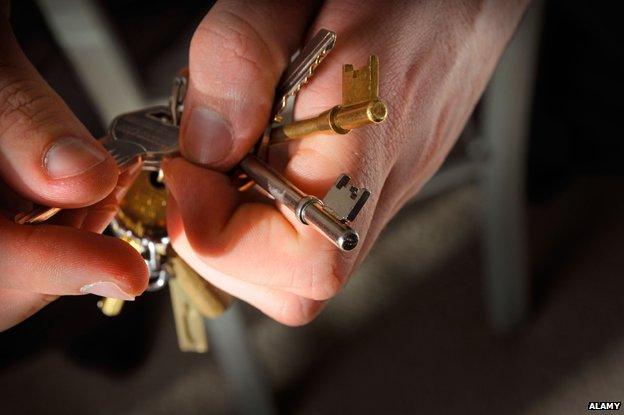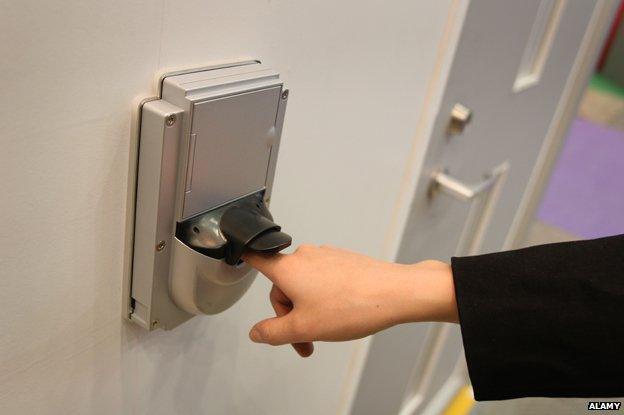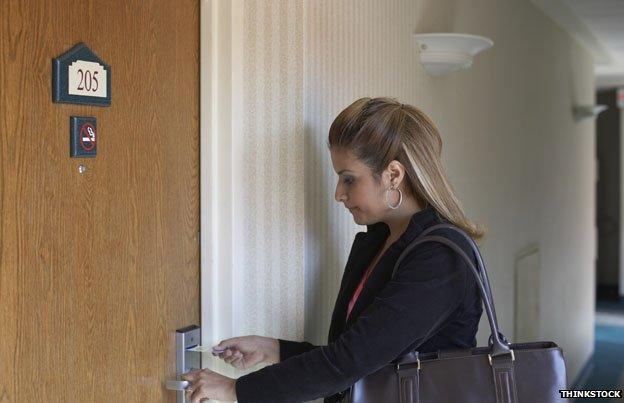Is the traditional metal key becoming obsolete?
- Published

Since the Pharaohs, people have been using keys to lock things up. The metal key has proved remarkably resilient, but as electronic locking devices become ever-more popular, are the days of the humble key numbered?
It emerged this week that Range Rovers with keyless ignitions are a target for thieves and hard to insure in London, external. If someone is able to get inside a vehicle, it is possible to copy its keyless ignition code using a device bought on the internet.
At first glance it looks like a problem of replacing a tried-and-trusted object with an untested high-tech system.
But the Range Rover's problems are just "teething trouble", says Matthew Avery, research director at Thatcham, a security firm that tests cars for European safety standards. The big picture is that most new cars are being locked by electronics not a piece of metal.
More than 80% of vehicles now use some form of electronic key fob or keyless ignitions, Avery says. In five years time there will be no new cars being produced that rely solely on a metal key, he predicts.
As for the problems of theft in Range Rovers, this will be addressed with technology, he argues. There was a similar problem when the first electronic car zappers were introduced, with thieves copying the frequency of the locking noise to break in. But now the remote controls are secure by using a different code every time the vehicle is locked and unlocked, Avery says.
The next stage, he says, will see key fobs replaced by a smartphone with a code that unlocks the vehicle.

Almost as long as there have been doors there have been keys. It is thought the earliest were used in ancient Egypt. Their basic principle of a key lifting a series of pins out of a bolt, allowing it to move, is still used today. But most of this progress was as good as forgotten during the Middle Ages, says lock expert Schuyler Towne. The lock's design was refined in the mid-18th Century, with the addition of springs. The modern flat keys we use today were invented by Linus Yale Jr in 1861 and are largely an updated version of what ancient Egyptians used 4,000 years ago, says Towne.
It shouldn't surprise people too much if an invention from several thousand years ago becomes redundant. But keys have been remarkably resilient.
The hotel industry was one of the first to ditch metal keys. The first key cards were introduced at a hotel in Atlanta, US, in 1979. It was a simple card with a series of holes punched in it. The card has been widely taken up, but not only for security reasons - it reduces wasted electricity, since a guest can only operate the lights with the key in the holder. It also enables hotel staff to know when the guest is in their room, and, importantly, it means the lock does not need to be replaced if the key is lost.
In London, the Savoy, the Langham, the Dorchester and Claridges all use key cards, with the Ritz one of the few large hotels to eschew them. Soon even a card may be unnecessary. Next year Hilton guests in the US will be able to use their smartphone as a key to their room, external.
In other areas, biometric and key cards are being introduced in hospitals and schools - enabling access to cupboards and drawers on wards and lockers for students.
So will keyless systems start taking over in people's homes?

Some other functions of electronic keys

Controlling your front door via Bluetooth
Opening the door automatically if the user is nearby
Sending virtual keys to friends and relatives
Controlling what time certain people have access

Earlier this year Apple announced HomeKit, a new development framework which will allow programmers to create apps for home automation, such as door locking.
There is already a product, the August Smartlock, that opens house doors via a smartphone. The device lets the owner give other people access to the house digitally at specific times. "We want to be able to invite people and give access without having to make keys every time," its creator Yves Behar, has said, external. In the case of a power failure, a physical key will still open the door as a backup, the company says.
But many people will argue that while keyless systems and smart phones are great in theory, access to the home is too precious to entrust to technology.
Charles Arthur, a technology writer at the Guardian, says people may be happy to trust a card or smartphone for hotels and cars, but a much higher sense of security is attached when it comes to the home, he says. "Is it failsafe if there is a power cut, what happens if there is a fire, does it stop working? It's all a gigantic faff." And even if keyless systems take off, most people do not live in new-build housing. Retrofitting homes with smart high-tech locks, would be expensive and impractical.
Property expert Sarah Beeney agrees. Fingerprinting and retinal screening may become the norm one day, but she can't see them being cheaper or safer than the traditional metal key.
So why would people change, especially as people tend to be remarkably conservative when it comes to their houses?
Keys are still what people associate with solidity and security. The same used to be said with cash and credit cards - that people would not trust virtual money or online banking. So it's possible that attitudes will gradually shift on house keys.
But at the moment the metal key's popularity remains unchallenged by new innovations. In 2013 Timpsons, the key cutting store, sold about 16,250,000 keys - its highest total ever.
"A lot of these other electronic options are fine until you go on holiday," says John Timpson, the company founder. "Remembering codes and passwords is a nightmare. You can't beat the simple straightforwardness of a key."
And what about wear and tear, asks Brian Morland of the History of Locks Museum in Bournemouth. He cannot foresee a time when mechanical locks won't be part of our daily life. "You drop a key in water and it's okay. If you drop an electronic key (or smartphone) it will cause endless problems."
People shouldn't be surprised at the metal key's longevity, says David Edgerton, professor of the history of science and technology at King's College London. Look at paperclips, bicycles and books, tables and chairs. Most materials remain the same. "We think about the world as if it's constantly revolutionising itself from the bottom but it isn't. We don't go around on jetpacks, do we?"
Change is unpredictable. The key is dying out in some areas. But for locking our homes, we still place our trust in an ancient Egyptian invention.
Subscribe to the BBC News Magazine's email newsletter to get articles sent to your inbox.